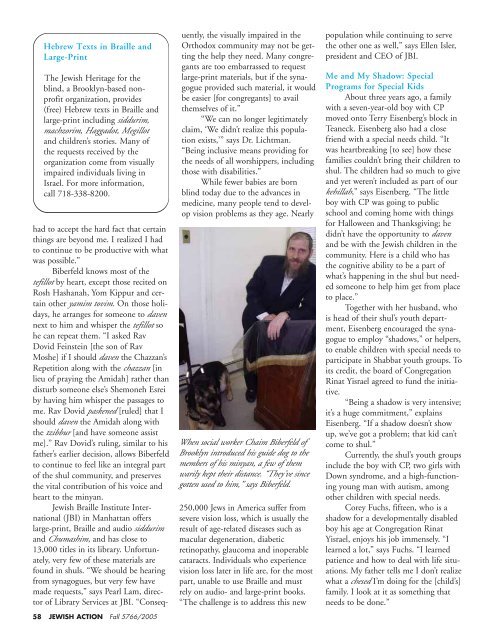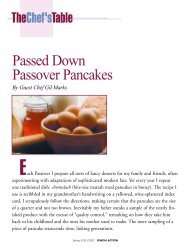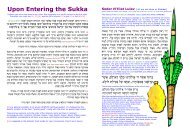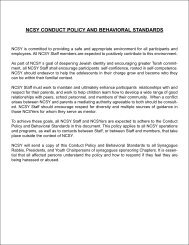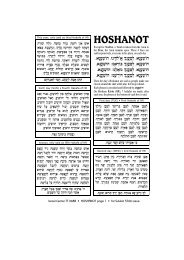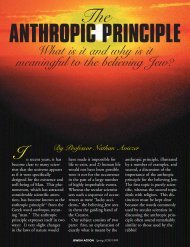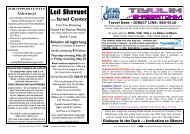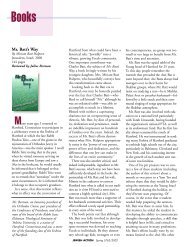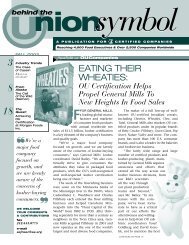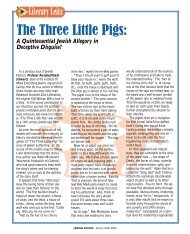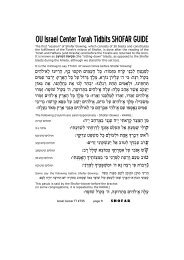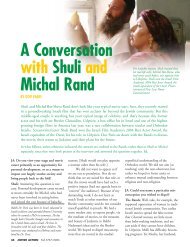welcoming jews with disabilities into jewish ... - Orthodox Union
welcoming jews with disabilities into jewish ... - Orthodox Union
welcoming jews with disabilities into jewish ... - Orthodox Union
Create successful ePaper yourself
Turn your PDF publications into a flip-book with our unique Google optimized e-Paper software.
Hebrew Texts in Braille and<br />
Large-Print<br />
The Jewish Heritage for the<br />
blind, a Brooklyn-based nonprofit<br />
organization, provides<br />
(free) Hebrew texts in Braille and<br />
large-print including siddurim,<br />
machzorim, Haggadot, Megillot<br />
and children’s stories. Many of<br />
the requests received by the<br />
organization come from visually<br />
impaired individuals living in<br />
Israel. For more information,<br />
call 718-338-8200.<br />
58 JEWISH ACTION Fall 5766/2005<br />
had to accept the hard fact that certain<br />
things are beyond me. I realized I had<br />
to continue to be productive <strong>with</strong> what<br />
was possible.”<br />
Biberfeld knows most of the<br />
tefillot by heart, except those recited on<br />
Rosh Hashanah, Yom Kippur and certain<br />
other yamim tovim. On those holidays,<br />
he arranges for someone to daven<br />
next to him and whisper the tefillot so<br />
he can repeat them. “I asked Rav<br />
Dovid Feinstein [the son of Rav<br />
Moshe] if I should daven the Chazzan’s<br />
Repetition along <strong>with</strong> the chazzan [in<br />
lieu of praying the Amidah] rather than<br />
disturb someone else’s Shemoneh Esrei<br />
by having him whisper the passages to<br />
me. Rav Dovid paskened [ruled] that I<br />
should daven the Amidah along <strong>with</strong><br />
the tzibbur [and have someone assist<br />
me].” Rav Dovid’s ruling, similar to his<br />
father’s earlier decision, allows Biberfeld<br />
to continue to feel like an integral part<br />
of the shul community, and preserves<br />
the vital contribution of his voice and<br />
heart to the minyan.<br />
Jewish Braille Institute International<br />
(JBI) in Manhattan offers<br />
large-print, Braille and audio siddurim<br />
and Chumashim, and has close to<br />
13,000 titles in its library. Unfortunately,<br />
very few of these materials are<br />
found in shuls. “We should be hearing<br />
from synagogues, but very few have<br />
made requests,” says Pearl Lam, director<br />
of Library Services at JBI. “Consequently,<br />
the visually impaired in the<br />
<strong>Orthodox</strong> community may not be getting<br />
the help they need. Many congregants<br />
are too embarrassed to request<br />
large-print materials, but if the synagogue<br />
provided such material, it would<br />
be easier [for congregants] to avail<br />
themselves of it.”<br />
“We can no longer legitimately<br />
claim, ‘We didn’t realize this population<br />
exists,’” says Dr. Lichtman.<br />
“Being inclusive means providing for<br />
the needs of all worshippers, including<br />
those <strong>with</strong> <strong>disabilities</strong>.”<br />
While fewer babies are born<br />
blind today due to the advances in<br />
medicine, many people tend to develop<br />
vision problems as they age. Nearly<br />
When social worker Chaim Biberfeld of<br />
Brooklyn introduced his guide dog to the<br />
members of his minyan, a few of them<br />
warily kept their distance. “They’ve since<br />
gotten used to him,” says Biberfeld.<br />
250,000 Jews in America suffer from<br />
severe vision loss, which is usually the<br />
result of age-related diseases such as<br />
macular degeneration, diabetic<br />
retinopathy, glaucoma and inoperable<br />
cataracts. Individuals who experience<br />
vision loss later in life are, for the most<br />
part, unable to use Braille and must<br />
rely on audio- and large-print books.<br />
“The challenge is to address this new<br />
population while continuing to serve<br />
the other one as well,” says Ellen Isler,<br />
president and CEO of JBI.<br />
Me and My Shadow: Special<br />
Programs for Special Kids<br />
About three years ago, a family<br />
<strong>with</strong> a seven-year-old boy <strong>with</strong> CP<br />
moved onto Terry Eisenberg’s block in<br />
Teaneck. Eisenberg also had a close<br />
friend <strong>with</strong> a special needs child. “It<br />
was heartbreaking [to see] how these<br />
families couldn’t bring their children to<br />
shul. The children had so much to give<br />
and yet weren’t included as part of our<br />
kehillah,” says Eisenberg. “The little<br />
boy <strong>with</strong> CP was going to public<br />
school and coming home <strong>with</strong> things<br />
for Halloween and Thanksgiving; he<br />
didn’t have the opportunity to daven<br />
and be <strong>with</strong> the Jewish children in the<br />
community. Here is a child who has<br />
the cognitive ability to be a part of<br />
what’s happening in the shul but needed<br />
someone to help him get from place<br />
to place.”<br />
Together <strong>with</strong> her husband, who<br />
is head of their shul’s youth department,<br />
Eisenberg encouraged the synagogue<br />
to employ “shadows,” or helpers,<br />
to enable children <strong>with</strong> special needs to<br />
participate in Shabbat youth groups. To<br />
its credit, the board of Congregation<br />
Rinat Yisrael agreed to fund the initiative.<br />
“Being a shadow is very intensive;<br />
it’s a huge commitment,” explains<br />
Eisenberg. “If a shadow doesn’t show<br />
up, we’ve got a problem; that kid can’t<br />
come to shul.”<br />
Currently, the shul’s youth groups<br />
include the boy <strong>with</strong> CP, two girls <strong>with</strong><br />
Down syndrome, and a high-functioning<br />
young man <strong>with</strong> autism, among<br />
other children <strong>with</strong> special needs.<br />
Corey Fuchs, fifteen, who is a<br />
shadow for a developmentally disabled<br />
boy his age at Congregation Rinat<br />
Yisrael, enjoys his job immensely. “I<br />
learned a lot,” says Fuchs. “I learned<br />
patience and how to deal <strong>with</strong> life situations.<br />
My father tells me I don’t realize<br />
what a chesed I’m doing for the [child’s]<br />
family. I look at it as something that<br />
needs to be done.”


